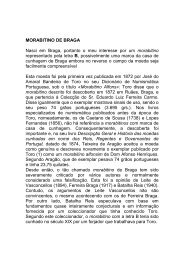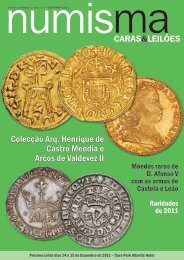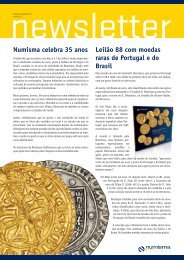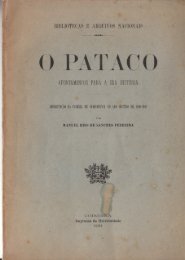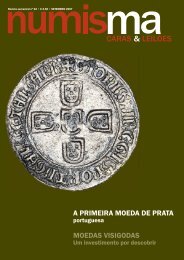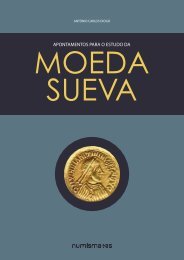You also want an ePaper? Increase the reach of your titles
YUMPU automatically turns print PDFs into web optimized ePapers that Google loves.
In 1070, King Henry IV deposed duke Otto, granting the duchy instead to Count Welf, a member <strong>of</strong> the Italo-<strong>Bavaria</strong>n family<br />
<strong>of</strong> Este. Welf subsequently quarreled with King Henry and was deprived <strong>of</strong> his duchy for nineteen years, during which<br />
it was directly administered by the German crown. Welf recovered the duchy in 1096, and was succeeded by his sons<br />
Welf (II) and Henry (IX); the latter was succeeded by his son, Henry (X), who also became Duke <strong>of</strong> Saxony.<br />
Welf I 1070-1077, 1096-1101<br />
Welf was the son <strong>of</strong> Azzo II <strong>of</strong> Este and his wife Chuniza <strong>of</strong> Altdorf. When Welf's maternal uncle, Welf, Duke <strong>of</strong> Carinthia (also<br />
known as Welf III), died childless, Welf inherited his property. Welf married Ethelinde, daughter <strong>of</strong> Otto II, Duke <strong>of</strong> <strong>Bavaria</strong>.<br />
Although the Marquis <strong>of</strong> Este, guided by his cousin Matilda, continued firm in the Pope's interests, his son Welf, who had succeeded<br />
to the <strong>Bavaria</strong>n states, and whose views were more immediately directed to Germany, supported the emperor. For his fidelity<br />
he was rewarded with the duchy <strong>of</strong> <strong>Bavaria</strong>, which had been forfeited by Otto, his father-in-law. When Duke Otto had be<strong>com</strong>e an<br />
enemy <strong>of</strong> King Henry IV, Welf divorced Ethelinde, and soon thereafter (in 1070) was appointed duke <strong>of</strong> <strong>Bavaria</strong> in Otto's stead.<br />
This event took place at Goslar in 1070, when the states <strong>of</strong> <strong>Bavaria</strong> submitted quietly to the new made duke, who was the representative<br />
<strong>of</strong> one <strong>of</strong> the most ancient families in the province; and although, in <strong>com</strong>pliance with the <strong>com</strong>mands <strong>of</strong> the emperor, he<br />
afterwards repudiated his duchess, the daughter <strong>of</strong> Otho, we do toot find that his influence was at all affected by such an act,<br />
which savored somewhat <strong>of</strong> injustice.<br />
During the Investiture Controversy, Welf sided with Pope Gregory VII, and in March 1077 supported the election <strong>of</strong> Rudolf <strong>of</strong><br />
Rheinfelden as anti-king. They were reconciled in 1076, but the following year saw them again engaged in active hostilities. Henry,<br />
in consequence <strong>of</strong> these repeated acts <strong>of</strong> rebellion, deprived him <strong>of</strong> his newly-acquired sovereignty; but, supported by his faithful<br />
<strong>Bavaria</strong>ns, and aided by his father in Italy, he was able to maintain his place, and to set the ban <strong>of</strong> the empire at defiance in May<br />
1077.<br />
Welf joined the discontented princes who supported the standard <strong>of</strong> Rudolph, when all were put without the pale <strong>of</strong> the church who<br />
refused to obey the mandate <strong>of</strong> that Pope; and in that age <strong>of</strong> ignorance and superstition, many were obliged to <strong>com</strong>ply with a<br />
Pope's mandate, who otherwise would have supported the sovereign <strong>of</strong> their own choice. Fortunately for the peace <strong>of</strong> Germany,<br />
Gregory died in 1085, and Welf , though he still adhered to the party <strong>of</strong> the church, began to relax in his exertions to maintain the<br />
usurper. In 1089, Welf's son Welf married Matilda <strong>of</strong> Tuscany, thus strengthening relationships with the pope. After the younger<br />
Welf divorced Matilda in 1095, Welf made amends with King Henry IV and was reappointed as duke <strong>of</strong> <strong>Bavaria</strong>.<br />
On the divorce <strong>of</strong> his first wife, Welf married a princess <strong>of</strong> Flanders, the widow <strong>of</strong> Tostig Godwinson, Earl <strong>of</strong> Northumbria, in<br />
England, and the sister <strong>of</strong> the queen <strong>of</strong> William I <strong>of</strong> England, the conqueror <strong>of</strong> that kingdom.<br />
After the death <strong>of</strong> his father Azzo in 1097, Welf tried to acquire his father's property south <strong>of</strong> the Alps, but did not succeed against<br />
his younger half-brother Fulco.<br />
In 1099, Welf joined the Crusade <strong>of</strong> 1101. He died while returning from the crusade in Cyprus in 1101 and was buried in<br />
Weingarten Abbey. He was succeeded as duke <strong>of</strong> <strong>Bavaria</strong> by his son Welf.<br />
Welf II 1101-1120<br />
Welf II (1072 – 24 September 1120, Kaufering), or Welfhard, called Welf the Fat, was duke <strong>of</strong> <strong>Bavaria</strong> from 1101 until his death. In<br />
the Welf genealogy, he is counted as Welf V.<br />
Welf was the oldest son <strong>of</strong> Welf I, Duke <strong>of</strong> <strong>Bavaria</strong>, and his wife Judith <strong>of</strong> Flanders. In 1089, he was married to Matilda <strong>of</strong> Tuscany,<br />
who was 26 years older, in order to strengthen the relation between his family and the pope during the Investiture Controversy<br />
between king and pope. During King Henry IV's Italian campaign <strong>of</strong> 1090, Welf and Matilda fought against the King.<br />
Since Matilda had secretly transferred her property to the Church before her marriage, Welf left her in 1095 and, together with his<br />
father, changed sides to King Henry IV, possibly in exchange for a promise <strong>of</strong> succeeding his father as duke <strong>of</strong> <strong>Bavaria</strong>.<br />
After his father's death in 1101 Welf indeed inherited the <strong>of</strong>fice <strong>of</strong> duke <strong>of</strong> <strong>Bavaria</strong>. He continued his alliance with the kings; he did<br />
not remarry and died childless in 1120. Welf was buried at Weingarten Abbey.





